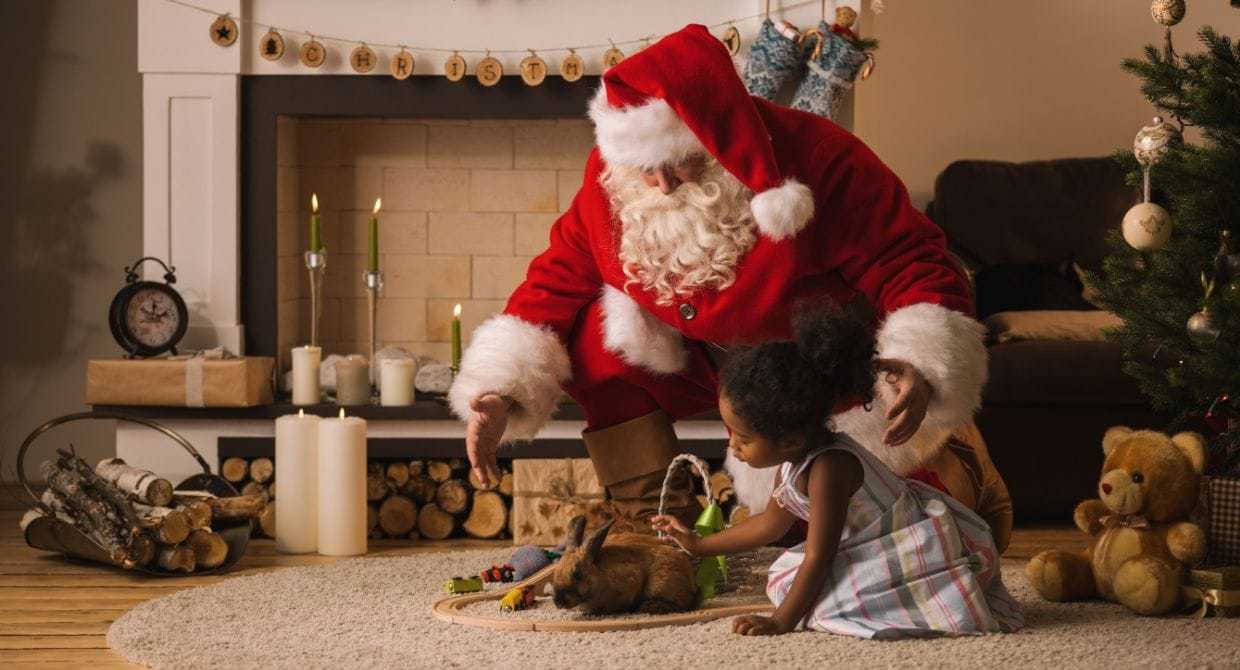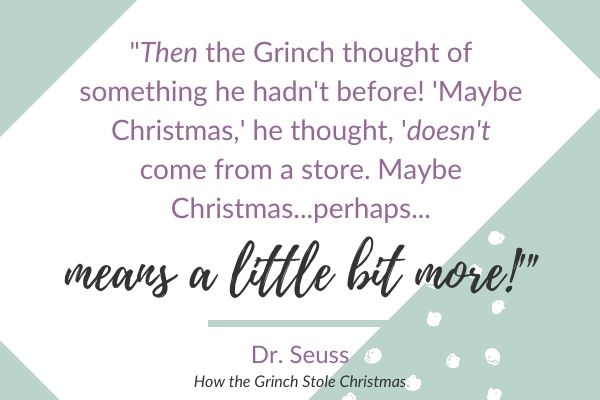The Truth About Santa–and 4 Ways to Keep His Magic Alive

Amy’s Note: I know how personal Santa is to you and your family. My intention isn’t to pass judgment, encourage one belief over another, or step on any toes. For those of you that have introduced Santa to your kids, or are considering it, these are simply ideas to transition away from a storybook Santa–whenever the time is right–and embrace a lifetime of actionable kindness and generosity.
To millions around the world, the holiday season is incomplete without a jovial, resonant “Ho Ho Ho.”
Santa Claus isn’t just a Christmas icon. Various countries and cultures have adopted the concept of Kris Kringle and run with it.
Any belief in Santa is deeply personal and can be presented and discussed however parents and caregivers choose.
But if Santa has become part of your family’s traditions, there comes a time when kids learn who’s really making the gift list and checking it twice.
As is true with the majority of positive parenting strategies I teach, the most effective way to navigate conversations about Santa is to take a proactive approach.
So, while children are still whimsically wrapped up in Mr. Claus, here are tips to gently prepare them for the inevitable, big reveal.
Lay the “Christmas Spirit” Groundwork Early On
Many kids grow up entrenched in the idea of Santa. Babies are cuddled in his arms and toddlers sit on his giant, welcoming lap. Kids smile earnestly–or cry just as intensely–for the photo op.
From our earliest Christmases, we know the old man in red works wonders. He has reindeer and a sleigh that circumnavigate the globe in a day. He automatically knows who’s been naughty and nice. And, he’s the keeper of the most coveted gifts.
These visions of Santa make the holidays fun for kids and adults alike. The younger kids are, the more we can lean into these concepts and watch the wonder unfold.
However, as wonderful as it is to delve into the magic, we can also lay the foundation for a future, longer-lasting Santa. Even as we line our kids up for photos and create cotton-ball beards, we can gently redirect them towards his character instead of his toy sack.
This way, when kids soon discover that nothing short of time travel can transport a person to that many houses in one night, they’ll have the spirit of Santa to inspire them in new ways.
Before the truth comes out, here are a few areas to focus on…
Emphasize Santa’s Kindness and Hard Work
One day, Santa won’t be landing on powdery-white rooftops. He’ll be a next-door neighbor helping your teenager shovel snow for the shared cul-de-sac.
Another day soon, Santa won’t be gobbling up cookies on coffee tables. He’ll be volunteering with your family at the food shelter on Christmas Eve.
Santa, in essence, can be anyone who works hard to make a difference.
The idea is, when we accentuate all the good things Santa does for people around the world, our kids can better comprehend the Christmas spirit: an attitude and moral code that can transcend all religions and traditions. It’s something your slightly older child will really be able to get behind.
In short, it’s never too soon to teach the true meaning of the holidays. When your kids’ visions of Santa and sugar plums are combined with true Christmas spirit, they won’t feel such a loss when the magic fades.

Once our kids understand the true spirit of Santa, it’s also important to…
Abandon Naughty and Nice (and an Emphasis on Material Gifts)
If we want to accentuate the Christmas spirit, it’s also time to deviate from “naughty or nice.”
While your kids are still young and believers in Santa, consider creating an environment where Santa doesn’t judge. An atmosphere that isn’t about give-and-take.
Naughty behavior isn’t acceptable around the holidays or any time of year. But that doesn’t mean we should promise gift rewards for commendable behavior — especially when kids are told that Santa and his elves monitor their behavior and actions non-stop.
Some kids latch on to Santa’s Big Brother tendencies to spy. Although he’s a lovable spy–the white-haired 007 type–it’s still discouraging, especially for kids who struggle with impulse control.
It may be awesome that Santa can do practically anything, but it’s equally intimidating that he can see and hear everything.
This sense of demoralization, especially for children who struggle to make appropriate choices, isn’t going to keep them from acting out less. In fact, it may increase bad behavior.
And any subsequent good behavior will be carefully calculated on earning back gifts.
Your kids will think, “If I don’t make Mommy and Daddy mad today, or most of the day tomorrow, I’ll probably still get my favorite gifts on Christmas morning!”
To be fair, it’s not really their fault–kids are practically trained to focus on what Santa will bring them each Christmas. But this sense of rewards, entitlement, and materialism is not what we want them focused on.
Using gifts as a ploy for good behavior may seem expedient and practical for parents. But it misdirects kids from the true meaning of the holidays. It also creates a power struggle and a scenario in which parents are unlikely to follow through (you’re probably still going to give them presents, aren’t you?).
It’s far kinder to find other ways to help our kids behave appropriately, and let Santa remain a jolly old elf.
Even after equipping your kids with long-term skills for better behavior, it can still be tough when they learn that Santa had nothing to do with any of it.
If you’re worried your child will feel deceived…
Explore Any Concerns About “Lying”
Sadly, it’s true; some kids are devastated when they read the fine print. They glom onto the fact their parents lied about Santa.
There’s no way to completely control how a child will react when learning who really delivers the presents. However, it’s a less earth-shaking surprise when parents regularly emphasize the tangible, real-world actions that bring Christmas cheer.
If Santa is the Christmas spirit, and the Christmas spirit is kindness in action, then maybe Santa IS real?
This could be the truth you choose to emphasize all throughout their Santa-believing days.
If you’re uncomfortable with the idea of lying about Santa to your kids, then don’t. Omit more frivolous details, try not to emphasize them, or respond with questions like, “What do the stories say?” or “What do you think?” when your kids ask for answers. And don’t promote Santa at all if it feels disingenuous.
Instead, consider telling your kids that some parents play a game where they pretend Santa brings presents. Ask if they’d like to play too.
Teaching kids to love and to give through the concept of Santa Claus is always a choice. It’s your call whether–and how–to do it.
Now that you’ve laid the groundwork for the Santa-believing kid in your life, here are a few ways to gently spill the beans about Santa when the time comes (while still keeping the magic alive).
1. Emphasize the Freedom of Belief
The world is all the more fascinating with its eclectic traditions. And it’s truly a gift when everyone can celebrate the holidays in their unique, special ways.
Explaining that traditions and beliefs often vary by family helps kids transition to a new level of understanding of Santa Claus. They’ll learn there is more than one way to look at things. They can determine what they wish to see and what works for them.
But kids also need to understand their beliefs may not be held by others.
Viewing Santa through a black and white lens can lead to that “belief-system let-down” we prefer to avoid. When other kids present opposing views, or we, as parents, pull back the curtain, we don’t want them to feel misled.
We want them to feel enlightened.
Reminding our kids that everyone chooses their beliefs–including how they choose to view Santa–leaves room for interpretation, wonder, and possibility.
2. Embody Real Magic
Once their eyes are opened to the truth, it’s easier for kids to let go of Santa when they discover he (or she) is already in the house.
Our actions and attitudes as parents can make the small things in life special, like focusing on things we’re grateful for and finding beauty everywhere.
Every day should be full of little bits of magic–real magic–and everyday heroism.
Start with music. Fill your car rides, bath time, and virtual schooling breaks with all the tunes that make your heart happy. Sing along, all year long! We don’t want Santa to be the only magical concept our kids encounter each year.
Because Santa lives for giving to others, show how you choose to give to others every day. It can be something small, like making cookies for a neighbor or just making dirty dishes disappear. Let your kids learn from your examples and help, too.
Santa also has a great work ethic. So, illustrate all the wonderful things that come from practice and effort. After a day organizing the house, hang new fairy lights in the living room to show how beautiful it can look. Or, after patiently watching a YouTube video on cake decorating, show your kids how learning something new can be rewarding, pretty, and delicious!
And because your kids are growing up, one way to spin the Santa conversation in a positive and empowering way is to…
3. Label the New Information “Privileged Knowledge”
Many of us want to keep the idea of Santa alive as long as possible. We like witnessing the magic in our kids’ eyes. We hate to relinquish their innocence to a more complex truth.
But often, kids learn about Santa way before we’re ready to talk.
Maybe it was know-it-all Aiden telling the kindergarten class the North Pole is just an ocean of shifting ice. Or, your 8-year-old stumbled across the Claus costume in your husband’s corner of the closet.
How you manage interrogations from suddenly upset or curious kids depends on your wishes and beliefs. It could be time to reaffirm your stance, come clean, or simply shift gears.
But one possible conversation could go like this:
“Lily–I know you’re upset about what Aiden said. While it wasn’t his place to tell you, he wasn’t lying, either.
Now that you’re old enough, let me share some privileged knowledge with you.
Santa, in a big way, is always real. He may not glide the globe in a day, have a full-fledged workshop at the North Pole, or fill your stocking on Christmas Eve. But the idea of Santa reminds us all to think of others and to always give.”
Keep in mind, literal questions like “How can Santa come into our house when we don’t have a chimney?” may indicate your children are ready–and eager–for the truth. They’re likely at a high enough cognitive level to grasp deep, multilayered concepts, and they’ll gain confidence when their questions are respected.
We can always give kids the benefit of the doubt when it comes to their reasoning and their ability to cope with loss–even grief. They can handle it (and you can too).
With a little guidance, they can also handle the responsibility of keeping the truth on the down-low…
Keep Them From Divulging Santa Intel
Hopefully, your kids won’t feel the need to broadcast the privileged knowledge you’ve entrusted to them.
By harboring knowledge they’re now “grown-up enough” to process, they may even feel more important than ever.
Still, any conversation about Santa can end with a short caveat:
“I have confidence you’ll let your friends and siblings enjoy Santa’s magic a little longer. It was a special time for you, and it’s special for them, too.”
Kids are always encouraged when we express our confidence and faith in them. And they benefit greatly from open communication.
Regardless, kids might tattle about Santa to feel more important. Or, maybe they’re angry with an uncomfortable new reality.
We can help by expressing our empathy. The more kids feel validated for their big, complicated feelings, the less they’ll feel like invalidating the feelings of others.
Regular doses of encouragement and positive attention can also lessen any desire to divulge.
And, especially for younger kids, we can take a few minutes to practice conversations they might have with their friends or siblings, reinforcing how to not spill the beans.
Quite possibly the best way to ensure their lips stay sealed is to…
4. Light the Way to Santa-Hood
Breaking the news about Santa doesn’t need to be sad or negative. Instead, we can think of the realization as a beautiful “aha” moment.
This fresh, optimistic insight is the chance to pass the torch of kindness and generosity without extinguishing it. And, it’s a great way to counter all the excess and expectation of the holidays.
This isn’t when childhood has to come crashing down. Instead, it’s when kids realize their parents–the ones who love them the most–are the true givers. It’s when they learn the holidays are about love and altruism–not about expecting, list-making, and judgment.
And if we want our kids to spread Christmas-like cheer all year long, invite them in to “play Santa” during this holiday season.
Let your older children take a bite out of the Santa cookies your toddler put out. Invite them to stuff stockings for their younger siblings. Encourage them to leave powdered-sugar boot prints on your driveway for Christmas morning.
Kids will soon catch on that the behaviors they see modeled in Santa Claus, and their own loved ones, are worth emulating–which means they have the power to become the jolly old elf himself.
Final Thoughts
It may feel like letting your kids in on the Santa secret is the end of something magical. But it’s really a wonderful beginning. Take this beautiful opportunity to tell your kids it’s their turn to embody the Christmas spirit.
It’s not just about passing out gifts on Christmas morning. It’s a special, lifelong chance to spread kindness and joy. And it doesn’t have to be wrapped.
We want them to feel fortunate to be a part of this–the true magic of the season.
What You Should Do Next:
1. Get Quick Actionable TIPS delivered to your inbox
Sign up for my newsletter for parenting tips to help you create a happier home and become the parent you always wanted to be. Plus, when you subscribe, I'll also send you a copy of our strategy-packed guide 10 Tips for Better Behavior – Starting NOW!
2. Unlock the secrets to easier parenting in my FREE CLASS
Register for my free class called How to Get Kids to Listen, Without Nagging, Yelling or Losing Control. Classes run several times per week to accommodate your busy schedule.
3. Transform your family with the 7-Step Parenting Success System® Course
Join the hundreds of thousands of parents who have transformed their families with the 7-Step Parenting Success System® Course. Learn the tools you need to raise happy, respectful, responsible kids and create the family life you always dreamed of having.
About the Author






